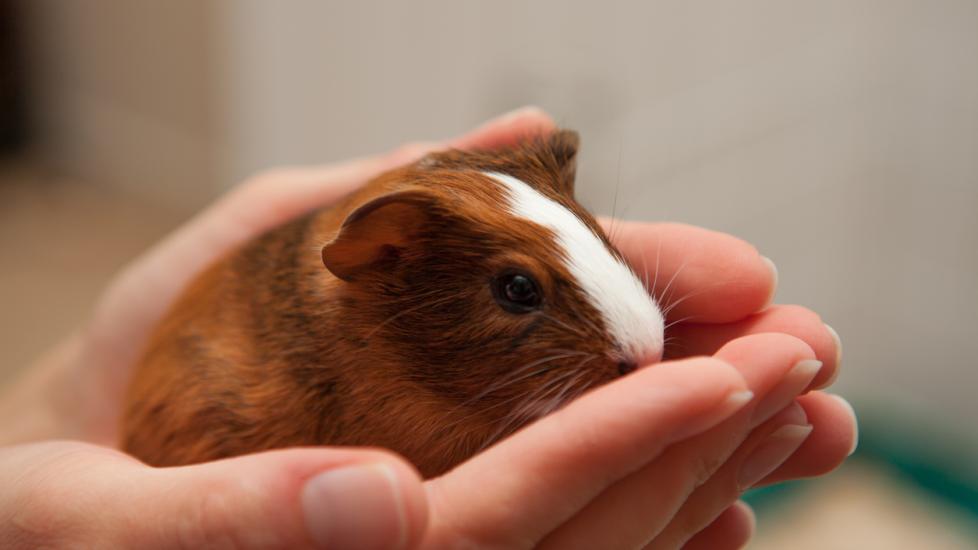How Long Do Guinea Pigs Live?
Guinea pigs, also known as cavies, are typically docile, easy-to-handle, and loving mammals that can make fantastic pets. Related to capybara and mara, they are one of the larger types of rodents. Wild guinea pigs still roam free in South America.
While they can be great pets, it is important to perform research on the species before bringing one home. Guinea pigs require a specific diet, carefully constructed housing, and have unique medical needs.
Guinea Pig Lifespan
Guinea pigs live for an average of 5-7 years, but some have lived much longer. In fact, according to the Guinness Book of World Records, the oldest known guinea pig was almost 15 years old! More commonly, domestic guinea pigs live an average of 5 years. In the wild, guinea pigs typically live for 1-4 years, as they are a common prey species and live in sometimes harsh environments.
Male guinea pigs are called boars, while female guinea pigs are called sows. Boars are usually a little heavier, weighing between 2-2.5 pounds. Sows may weigh 1.5-2 pounds. Guinea pigs have a unique, and quick, life cycle:
- Gestation averages 68 days
- Average of 4 pups per litter, but litters over 10 have been recorded
- Pups are born with their eyes open and weaned at 21 days
- Boars are fully mature by 3-4 months old, but may display male behavior much earlier
- Sows are fully mature by 6-8 months old, but can become pregnant sooner
- Guinea pigs are considered seniors at 3 years, and often show signs of aging or chronic disease
One of the most important medical issues for sows concerns the potential for breeding. The guinea pig’s pelvis fuses between 9 and 12 months of age. Therefore, the sow must be bred before the pelvis closes or pups are unable to fit through the birth canal. Many pregnant guinea pigs die during the birthing process, so it is best to leave breeding to professional breeders and veterinarians with experience. It is also important to not keep intact (not spayed or neutered) animals together if they will not be bred.
A guinea pig’s breed may also partially determine its longevity. The hairless breed, called the skinny guinea pig, has an average lifespan of 7-8 years, while some guinea pigs with longer hair only average 4 years. More research can be done to determine the factors involved in breed longevity, but diet and husbandry can make a huge difference on the lifespan of ALL guinea pig breeds!
What Makes Some Guinea Pigs Live Longer Than Others?
Genes play a role in guinea pig life expectancy. While many guinea pig pets are rescued or adopted, if you purchase a guinea pig from a breeder you may want to ask how long their lines typically live. The genetics of life expectancy, while important and fascinating to research, are only a small piece of the puzzle to keeping guinea pigs happy and healthy for a long time.
Good husbandry, or the care and management of guinea pigs, is crucial. Many pet stores and companies produce items marketed for guinea pigs with little or no safety research. Keep this in mind when purchasing supplies for your guinea pig—just because a product claims to be good for a guinea pig doesn't mean it always is. In general, good guinea pig husbandry includes:
- A diet that consists of unlimited grass hay, vegetables, and small amounts of pellets
- Vitamin C supplementation, because guinea pigs cannot make their own vitamin C and depend on it from their diet
- Proper housing that avoids extreme heat or cold
- Safe and proper toys to entertain, enrich, and exercise your guinea pig
- Proper and routine veterinary care
How to Extend Your Guinea Pig's Lifespan
Here are some tips to follow for guinea pig pet parents who want the best for their pet:
- Feed unlimited amounts of high-quality grass hay, like Oxbow, in addition to multiple vegetables and high-quality guinea pig pellets daily
- Offer multiple foods on rotation (using caution to not cause stomach upset)
- Weigh your guinea pig weekly to closely monitor changes
- Take your guinea pig to the vet every 6-12 months
- Once your guinea pig is 3 years old, make sure your veterinarian checks bloodwork every 6-12 months
- Supplement with vitamin C tablets
- Rotate multiple toys to keep your cavy from getting bored
- Guinea pigs are herd animals and shouldn’t be kept alone unless they have extreme health or temperament issues
- Allow frequent exercise, especially supervised time out of their cage at least 1 hour a day, if not more
- Examine your guinea pig daily for signs of illness
- Clean water and food dishes daily, and change all bedding every 3-4 days
- Keep your guinea pig’s home well-ventilated
References
Help us make PetMD better
Was this article helpful?
